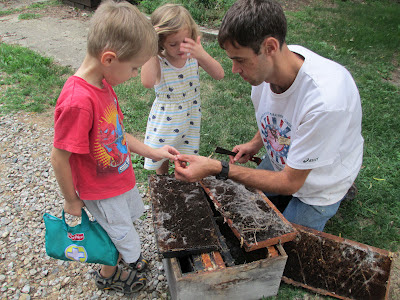So you want to know more about bee pollen? We received some questions from one of our faithful blog followers (thanks Marfa!) and also get many questions from our farm market customers about bee pollen. What is it? What do you do with it? How do you harvest it? How does it get in that little granule form?
All great questions. I will attempt to answer them here.
 |
| Pollen can be eaten fresh, put in smoothies, on cereal, in yogurt, mixed with honey, and more. |
 |
| See the bee in the middle with the bright yellow pollen sac? |
We have a device called a "pollen trap" which sits on the bottom of their hive. As the bees enter the pollen trap, the sac of pollen is brushed from their legs and falls through a screen below the hive. But don't worry.... we never take all the pollen from a hive. The trap can be turned on and off so the bees have plenty of pollen for their own health and vitality.
 |
| Here you see another bee with a small amount of pollen on her leg. |
This is what the pollen trap looks like when it is not attached to the hive. It is basically a series of screens that the bees much walk through to get up into the hive. As they pass through the screens, the pollen is knocked from their legs and falls to a tray below.
This next picture shows the pollen trap on the bottom of the hive. The very bottom wooden part is called the "screened bottom board." The white part on top of that is the pollen trap. You can see the little pull out compartment on the hive in the background.
And here you see the compartment being pulled out... full of fresh pollen! We simply pull out the screen, and drop the pollen in a bucket. It is ready to be cleaned and bottled.
Sometimes ants and other little insects find their way in to the pollen, so we have to sift through it and pick it out with tweezers. It is tedious and time consuming, which is why pollen is worth at least $8 for 7 ounces. But don't let the price scare you, because if you only take a teaspoon or two a day, it will last a long time. It's less expensive than most multi-vitamins.
Why do people eat pollen? Most of our customers eat pollen as a nutritional supplement. Although all pollens will differ in nutritional components based on the kind of pollen, this gives you a good idea:
Carbohydrates 48.5%
Fiber 14.2%
Fatty Acids 9.9%
Ash 3.5%
Bee pollen is abundant with vitamins, minerals, amino acids, and more. It is the only food that contains all 22 essential known nutritional elements. I have read that it is possible to survive on bee pollen alone, as long as you have enough "roughage" to aid digestion.
Another reason people eat bee pollen is to help prevent local pollen related allergies. By eating just a teaspoon a day, the body gets used to the local pollens. The pollen we have been harvesting over the past week is full of bright yellow ragweed. If you have severe ragweed allergies, you will want to take it slow... don't sit down and eat a large spoonful right away, because you may have a severe allergic reaction. Take just a little bit every day until your body is used to it.
If you are curious about the other benefits of bee pollen, do a simple google search and you will find more information. Many people believe that pollen can cure almost any ailment. We aren't going to claim that here... but we have plenty of happy customers that report feeling more energetic, healthier, appetite suppression, and more. If you'd like to give it a try, here is the listing where you can purchase it in our Etsy shop online.
Please let us know if there are other questions that remain unanswered! We love your comments!
Bee pollen is abundant with vitamins, minerals, amino acids, and more. It is the only food that contains all 22 essential known nutritional elements. I have read that it is possible to survive on bee pollen alone, as long as you have enough "roughage" to aid digestion.
Another reason people eat bee pollen is to help prevent local pollen related allergies. By eating just a teaspoon a day, the body gets used to the local pollens. The pollen we have been harvesting over the past week is full of bright yellow ragweed. If you have severe ragweed allergies, you will want to take it slow... don't sit down and eat a large spoonful right away, because you may have a severe allergic reaction. Take just a little bit every day until your body is used to it.
If you are curious about the other benefits of bee pollen, do a simple google search and you will find more information. Many people believe that pollen can cure almost any ailment. We aren't going to claim that here... but we have plenty of happy customers that report feeling more energetic, healthier, appetite suppression, and more. If you'd like to give it a try, here is the listing where you can purchase it in our Etsy shop online.
Please let us know if there are other questions that remain unanswered! We love your comments!


























